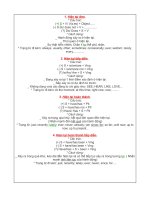thi trong tieng anh
Bạn đang xem bản rút gọn của tài liệu. Xem và tải ngay bản đầy đủ của tài liệu tại đây (114.66 KB, 3 trang )
<span class='text_page_counter'>(1)</span>Thời. Thì. Hình thức(form ) (+) S + V1 (-) S + don’t/doesn't – V…. (?) Do/ does + S + V….?. Đơn ( Simple present ). hiện tại (present Tense). tiếp diễn (present continuous). Hoàn thành (Present perfect ). 3.Nhận thức cảm tính khi nói 4.Nói về thòi khoá biểu, lịch trình công cộng(vận tải, rạp hát) 5. Tường thuật sự kiện quá khứ. + V-. 1.Hành động đang xãy ra vào lúc nói 2. Sự thay đổi dần dần ở hiện tại. I am not You/ We/ They are not + Ving She/ he/it is not. 3. Sự sắp xếp trong tương lai gần(của cá nhân). Are + You/ We/They + V-ing ? Is + She/ He/ It + V-ing ?. 5. Hành động lặp lại gây bực mình. I/ You/ We/ They + Have –V3 She/ He/ It + Has - V3. 1. Hành động bắt đầu từ quá còn tiếp tục đến hiện t ại và tương lai.. I/ You/ We/ They + Haven’t – V3 She/ He/ It + Hasn’t V3 Have + I/ You/ We/ They + V3 ? Has + She/ He/ It + V3 ? (+) S + have/has been - V-ing. Hoàn thành tiếp diễn (Present perfect continuous). 1.Sự thật, chân lí 2.Thói quen, hành động lặp lại ở hiện tại. * Note: to be -I + am - you/ we/ they + are - She/ He/ It + is Is not = isn’t Are not = aren’t Do not = don’t Does not = doesn’t I am You/ We/ They are ing She/ he/it is. Cách sử dụng(use). 4. Hành động tạm thời. 2. Hành động vừa mới xãy ra. 3. Hành động xẫy ra trong quá khứ, kết quả còn ở hiện tại 4. Hành động quá khứ mà thời gian không xác định 5. Hành động xãy ra và đã hoàn tất trong khoảng thời gian chưa qua. 1. Hành động vừa mới hoàn thành hay gần đây đã hoàn thành. (kết quả còn ở hiện tại). (-) S + haven’t /hasn’t been - Ving. (?) S + have/has been - V-ing...?. 2. Hành động bắt đầu từ quá khứ và vẫn còn kéo dài liên tục đến hiện tại.. Dấu hiệu nhận biết (How to reconigze). Ví dụ (example ). 2.1-Some adverbs: always, usually, often, sometimes, rarely, seldom, never. 1. New York is bigger than London.. 2.2 Everyday, twice a week. Once a year, three times a month. 3. I think that he is right. How old are you? Where are you from?. 3. Some verbs used: Know, hope, understand, wonder, think, guess, believe... 4. We do the final exam at the end of May.. 1-somes cases: Look! / Look at!... Look out..! / Be careful Be quiet/ Keep silent! Hurry up!..... -some adverbs: Now, at the moment, at present. 1. Look at! The child is running after the train. Be careful! The train is coming.. 3/ 4. today, this week, next week, ….. 4. This summer vacation, Tom is working at a shoe-shop.. 5. always, constantly, continually. 5. she’s always losing things.. 1.- since + mốc thời gian (Since 2008/ since last year..) For + khoảng thời gian (For two years,……..) Up to now, so far, up to the present, since then, recently 2. just. 1. I’ve learnt English for 5 years. We’ve lived here since 1998. 2. We have just had breakfast.. 2. I often get up at 5 a.m.. 2. The population is rising fast. It is getting darker and darker. 3. I’m meeting Tom tonight.. 3. He can’t go on holiday because he has broken his leg. 4. They have already seen this film.. 3/ 4. already, never ever, lately 5. today, this week, this month, this year, in the past few years, in the last two months, etc.. 2. since For How long. 5. I have talked to the director today. He has drunk coffee this morning.. 1. - You’re out of breath. Have you been running? - Paul is very tired. He’s been working very hard. 2- A: It is raining now. It began raining tow hours ago and it is still raining. B: How long has it been raining? A: it has been raining for two hours. - How long have you been learning English? (You’re still learning English).
<span class='text_page_counter'>(2)</span> So sánh các thì (1) Simple present (Hiện tại đơn). Present continuous (Hiện tại tiếp diễn ). 1. Tình huống lâu dài I live in Đà Nẵng.. - Tình huông tạm thời I’m living with my friend until I find a flat.. 2. Sự việc chung chung, lặp lại Water boils at 100 degrees Celsius. It doesn’t rain much in summer.. - Sự việc đang diễn ra, hay quanh thời điểm nói mà chưa hoàn thành The water is boiling. Can you turn it off? Let’s go out . it isn’t raining now.. now now 3. Nói về thời khoá biểu, lịch trình công cộng What time does the film start? The train leaves Hà Nội at 4.30 .. - Nói về sự xắp xếp cá nhân: What time are you meeting Ann tomorrow?. (2) Present continuous (Hiện tại tiếp diễn). Present perfect continuous (Hiện tại hoàn thành tiếp diễn). I am doing. Now Hành động đang xãy ra quanh thời điểm nói. 1. Don’t disturb me now. I am working. 2. We need an umbrella. It’s raining. 3. Hurry up! We’re waiting. I have been doing Now Hành động đã xãy ra ra hay vừa mới hoàn thành. 1. I’ve been working hard, so now I am going to have a rest. 2. The ground is wet. It’s been raining. 3. We’ve been waiting for an hour.
<span class='text_page_counter'>(3)</span> (3) Present perfect (hiện tại hoàn thành). Present perfect continuous (hiện tại hoàn thành tiếp diễn). 1. Hành động đã hoàn thành, chú trọng kết quả của hành động.. - Hành động chưa hoàn thành, chú trọng đến sự tiếp tục.. -have read I have read a book about elephant. (I finished reading the book ) 2. Nói về số lượng , số lần: I have read a lot about it. I have been to Africa twice. I have written three articles.. have been reading I have been reading a book about elephant. (I’m still reading it) - Nói về hành động đã xãy ra bao lâu: I have been reading books on elephants for two months.. 3. Hành động có tạm dừng. - Hành động liên tục: They have played tennis three times this week.. They have been playing tennis since 2 o’clock.. Present perfect và Present perfect continuous có cùng nghĩa cơ bản khi sử dụng với các động từ như: live, work, study, learn, teach, stay... với (for/ since) She has studied elephant for 3 years. She has been studying elephant for 3 years.
<span class='text_page_counter'>(4)</span>









